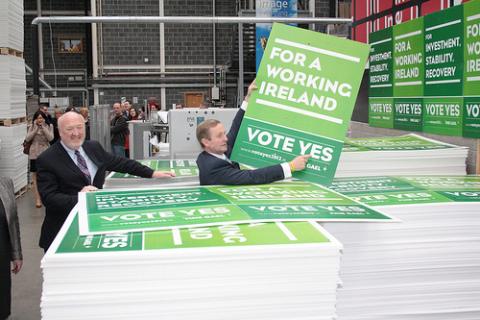The politics of fear is no politics at all

To surrender to fear is to surrender to perpetual austerity for future generations. By John Farrell Clark.
At the height of the Depression in 1933 Franklin Roosevelt spoke these words in his first inaugural address:
“This great nation will endure…will revive and will prosper…let me assert my firm belief that the only thing we have to fear is fear itself - nameless, unreasoning, unjustified terror which paralyzes needed efforts to convert retreat into advance.
“They (“money changers”) know only the rules of a generation of self-seekers. They have no vision, and when there is no vision the people perish.
“. . . we (need to) apply social values more noble than mere monetary profit.
“. . . our true destiny is not to be ministered unto but to minister to ourselves and to our fellow men.”
So far our government leaders are only using a fear campaign in that they say that if we don’t approve the Fiscal Treaty, there will be no money available when a second bailout will likely be required. Frankly, this is no way to govern. Fear may be a motivator, but is that the kind of society we want to live in?
As to the subject of the austerity program that has been imposed upon us, Paul Krugman, the Pulitzer Prize-winning economist who writes a regular column for the New York Times, put it this way:
“Consider the case of Ireland, which has been a good soldier in this crisis, imposing ever-harsher austerity in an attempt to win back the favor of the bond markets. According to the prevailing orthodoxy, this should work. In fact, the will to believe is so strong that members of Europe’s policy elite keep proclaiming that Irish austerity has indeed worked, that the Irish economy has begun to recover.
“But it hasn’t. And although you’d never know it from much of the press coverage, Irish borrowing costs remain much higher than those of Spain or Italy, let alone Germany. So what are the alternatives?
“One answer — an answer that makes more sense than almost anyone in Europe is willing to admit — would be to break up the euro, Europe’s common currency. Europe wouldn’t be in this fix if Greece still had its drachma, Spain its peseta, Ireland its punt, and so on, because Greece and Spain would have what they now lack: a quick way to restore cost-competitiveness and boost exports, namely devaluation.
“As a counterpoint to Ireland’s sad story, consider the case of Iceland, which was ground zero for the financial crisis but was able to respond by devaluing its currency, the krona (and also had the courage to let its banks fail and default on their debts). Sure enough, Iceland is experiencing the recovery Ireland was supposed to have, but hasn’t.”
His analysis has merit and the alternative policy he proposes of growth from a return to the punt needs serious consideration. The present policies are about protecting investment banks and their holdings at the expense of taxpayers; and that is not a representative democracy. It’s about protecting not republics but ‘corporate states’.
However, and on a cash flow basis, it appears to me that if you backed out (didn’t pay) the debts of private banks which the government foolishly guaranteed, delayed payment on a portion of sovereign debts, made reasonable budget cuts and slightly increased the tax rate on upper income earners, there would be sufficient tax revenue to run the State. In that case the creditors would simply have to wait to get fully paid until we could afford to do so.
In essence Ireland is a bankrupt entity which has a clear source of revenue but non-sustainable debts. If Ireland had subjected itself to a classic bankruptcy proceeding, the first act would have been to suspend all creditor payments until a reorganisation plan could be drawn up. But Ireland never did that.
Instead the government wrongly guaranteed the debts of private banks and subjected itself to incurring even more debt. There was no money left that could have been used for capital projects and infrastructure investments which could have created needed jobs and new revenue. It was not only poor judgment; it was also a short-term solution to a long-term problem.
Going back to the punt and devaluing it would make Ireland’s exports extremely attractive; and at the present time it’s the only sector that is performing well. In addition, tourism would flourish as Ireland would become a very cheap place for tourists to spend their money. And by redirecting excess cash into transportation projects (rail and bus) there would be less dependence on the car to somewhat offset an increase in the price of imported oil.
For certain it would cause certain hardships, but this isn’t about us. It’s about the well being of our children and grandchildren. We owe it to them to right the wrongs that were made. Sometimes sacrifices need to be made for the long term greater good of our society. As President Roosevelt said on that cold day in March 79 years ago, “…our forefathers conquered because they believed and were not afraid.”
Agriculturally produced exports and tourism have always been Ireland’s strengths and - along with attracting foreign direct investments in a growing economy - we ought to stick to what we do well. It would be a new beginning in recapturing our national identity.
To surrender to fear is to surrender to perpetual austerity for future generations and to never regaining our sovereignty. We should take the heed of Iceland and take bold action. At the very least there needs to be an open and honest debate so voters can make an informed decision. And anyway, do we really think the world would just stand by and watch Ireland go down? I don’t think so.
{jathumbnailoff}
